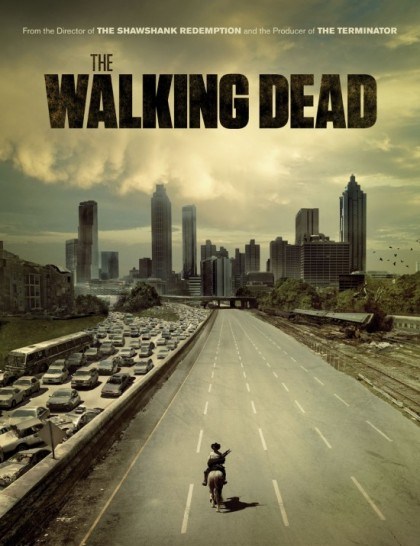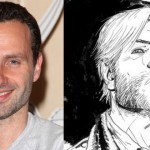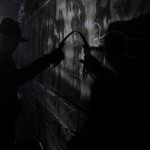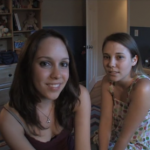October 31, 2010. Halloween. For many, it was a night to dress up, go trick-or-treating, and get more hammered than a hardware store. For many this year, it was the night to stay home and turn their televisions to AMC. Why? It was the night the world was introduced to The Walking Dead. Though based on the hit series written by Robert Kirkman and published by Image Comics, there were many who went into the show cold, not having reading the comic. Present company included. Going into it cold, how did the six episode season fare? What made it stand out and made it a hit success?
The show takes place in the aftermath of a zombie apocalypse. The world, much like the zombies is a shell of it’s former self. You’re probably asking yourself, “Hasn’t this been done a million times, already?” In a sense, you’d be right, but the saving grace of this show is this; where as movies that portray a zombie apocalypse spend very little time on the setting itself—a mere transition to establish the world isn’t what it used to be—this show makes the setting a character in itself. Everything has a dull, muted tone. When we think back to how things were, we remember them as a shining glow of memory. In the wake of such a horrible event, the world mirrors the zombies in that it’s decayed, it’s dirty and no matter what you do, it will never be what it once was. The cinematography is used to full effect, giving everything an uneasy feel.
In contrast to that, the area of the woods, a haven for a group of survivors is placed in vibrant greens and browns. There is life in those woods and is really one of the few settings in the show that gives you a chance to breathe and relax. You the viewer feel at peace during these scenes…well, about as much at peace as the story allows you.
The acting on this show is astounding. Leading the cast is Andrew Lincoln, playing Rick Grimes. A deputy sheriff wounded in the line of duty, Rick awakens to find the world he knew is all but gone and now overrun with zombies. He searches for his wife Lori (played by Sarah Wayne Callies) and son Carl (played by Chandler Riggs). Rick is our anchor, the person we relate to most on the show. When he struggles to search for his family, we’re rooting for him every step of the way.
But, as good as Lincoln is, he’s backed up by a strong supporting cast. Jon Bernthal plays Shane, Rick’s partner who finds and takes care of his family after believing Rick to have died in the hospital. Shane’s story is complex as he watches over Rick’s wife and son, while falling in love with Lori, Rick’s wife. Once Rick re-enters the picture, it is not an easy thing to live with. Laurie Holden plays Andrea, a woman who is taking care of her sister. Andrea has one of the stronger emotional journeys throughout the entire season, as she struggles with what it means to lose everything you know and love. A fan favorite, Jeffrey DeMunn plays Dale, an elderly camper who often serves as the heart of the group. Though other actors portray the survivors, these three give the show a look at all ends of the spectrum of what it is to hold on to a shred of good in such a bleak environment.
Though, not everyone is good. Although he must be sick of playing the bad ass, Michael Rooker does a spectacular job as Merle Dixon, a red neck who doesn’t play well with others. Though, ultimately left to get his comeuppance in the second episode, Rooker plays Merle with such anger and charisma that you wish he wasn’t handcuffed to a pipe on the roof. Playing his brother Daryl, Norman Reedus shows you that Dixon men aren’t the type to take bad news laying down. Daryl, often choosing to shoot his crossbow first and asks questions never, straddles the line between concern for his brother and violent rage doesn’t grow much as a character but then again he doesn’t need to. And finally, Noah Emmerich as Dr. Jenner, the last man in the Center for Disease Control or CDC for short. Jenner isn’t quite good nor is he all bad. Jenner is a man locked in quarantine trying his hardest to find some reasoning behind the zombie outbreak, unfortunately he isn’t the best at what he does and solitude has gotten to him. Jenner may be one of the more tragic characters of the show.
And that’s something else that needs to be addressed. From what’s been said of this adaptation, it follows the comic in terms of how bleak it is. There are small blips of hope and happiness like Rick finding his family or Andrea smiling as she finds the perfect birthday gift for her sister, but those moments are few and far between. The show takes something as happy as riding a horse along the empty streets of Atlanta to something as horrible as a horde of zombies around the corner (literally) ripping said horse to pieces.
Speaking of Zombies, what I found most interesting about this show was how sparingly they were used. In this world, Zombies are more a force of nature. They arrive, they inflict damage and discord and that’s the end of it. They’re always on the periphery waiting. And thanks to practical effects, they feel all too real. The prosthetics give the zombies a look of true decay. Whether they’ve risen from the grave or have recently been turned, the undead look like shells of former people as opposed to a bunch of zombie fans in poor make up chewing the scenery more than human flesh. Had the zombies not worked, I don’t think the premise of the show would have, either.
That’s the thing about this show. While it may not be the happiest of shows out there, and while it may spend more time focusing on the people more than it does the zombies, that’s its ultimate strength. The show is more about how people struggle to survive themselves than an unseen destruction of society. And while the formulaic “People are the real monsters” cliché is alive and well here, what keeps us coming back for more is people like Rick Grimes who, despite constant kicking while he’s down, continues to get up and make hard decisions simply because it’s the right thing to do.
Though only six episodes, this first season told a story that started and ended with a bang. And not just in the metaphorical sense. Going into this show cold, there is no way to tell what’s going to happen to the characters. Will we ever find out what caused the Zombie outbreak? How do you cope with the notion that there are more of them then there are of you? Where the hell do you go from here? We’ll have to wait a year for those answers. I guess that’s the appeal of the show. Even when it’s filled with bleak and hopeless moments, you still hold on to that shred of hope things will be okay. In a nutshell, that is The Walking Dead season 1.


















